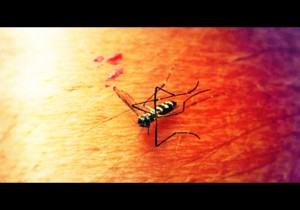Cases of Locally-Acquired Dengue Fever on Big Island of Hawaiʻi

Mosquito. Maui Now courtesy photo.
The Hawaiʻi State Department of Health is investigating two confirmed and four probable cases of dengue fever in Hawaiʻi residents and visitors. Health officials say cases were locally-acquired on the Big Island of Hawaiʻi.
Further testing and confirmation at the US Centers for Disease Control and Prevention is pending.
The department sent out a medical advisory to Hawaiʻi County clinicians earlier today to alert them and urge them to report suspect dengue fever cases.
“Although dengue is not endemic to Hawaiʻi, we do have the mosquito species capable of transmitting the disease,” said State Epidemiologist Dr. Sarah Park.
“It’s likely an infected traveler infected the local mosquito population, which led to this cluster, so we want the public to be aware of this mosquito-borne disease and the steps they can take to prevent infection,” said Dr. Park.
“Our local environmental health assessments have not found significant mosquito activity in the affected area,” said Hawaiʻi District Health Officer Aaron Ueno.
“As a precautionary measure the department is conducting mosquito prevention activities such as spraying with consent from property owners,” said Ueno.
Symptoms of dengue fever typically begin within a week after a bite by an infected mosquito and can include: fever, joint or muscle pains, headache or pain behind the eyes, and rash.
State health officials say individuals who have the above symptoms should contact their healthcare provider and avoid further exposure to mosquitoes, which is also the best means of prevention.
Health official say the dengue virus is most often transmitted through the bite of an infected mosquito.
Travelers to areas with infected mosquitoes where dengue fever is endemic are at the highest risk of acquiring the disease.
Mosquitoes can breed in areas of standing water, such as planters, old tires and pet water bowls.
As a precaution, the public can use mosquito repellents containing 20 to 30% DEET and wear long sleeves and pants in areas where mosquito-borne disease is a concern.










